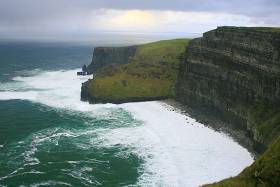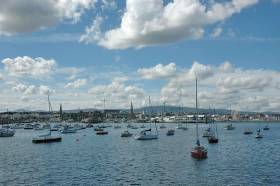Displaying items by tag: Courts
Tragic Cliff Jumper’s Parachute Opened Wrong Way, Inquest Hears
#CliffsOfMoher - An inquest into the death of a BASE jumper at the Cliffs of Moher earlier this year has heard how his parachute opened in the wrong direction as he was in free fall from the top of the Co Clare beauty spot.
As previously reported on Afloat.ie, the deceased was one of three men who had gone to Aill Na Searrach to perform the jump on the morning of Saturday 22 April.
In his deposition at the inquest, as reported in The Irish Times, Greg McEntee said he completed his own jump and landing safely just before the late Malcolm Rowley leapt from the edge.
McEntee described witnessing Rowley’s free fall and saw him opening his parachute “but when it opened, it didn’t open facing away from the cliffs.”
The incident was a “one in a 100” chance, said the veteran skydiver and BASE jumper of the deceased, whom he noted as having “a reasonable amount” of experience.
BASE (building, antenna, span and earth) jumping is the practice of parachuting from low-altitude fixed objects or cliffs. The extreme sport is considered illegal in most circumstances.
The Irish Times has much more on the story HERE.
#CheekiRafiki - The director of the yachting company that operated the Cheeki Rafiki has been convicted of failing to ensure the vessel’s safety when it was lost in the Atlantic three years ago.
James Male, Andrew Bridge, Steve Warren and Paul Goslin were lost at sea when their yacht lost its keel amid poor weather some 700 miles offshore of Nova Scotia in May 2014, as previously reported on Afloat.ie.
In October last year, Douglas Innes of Stormforce Coaching Ltd was charged with the manslaughter of the four sailors, as well as failing to ensure the safety of the vessel.
According to the Guardian, Winchester crown court heard that the Cheeki Rafiki has grounded three times prior to the incident, and that bolts holding the keel to the hull were found to have failed.
It was also claimed that Innes had planned an “unsafe” route from a regatta in Antigua to Britain, the voyage on which the tragedy occurred.
Innes has been released on unconditional bail pending sentencing. He also faces a retrial on the manslaughter charges after the jury failed to reach verdicts. The Guardian has more HERE.
#Angling - Inland Fisheries Ireland (IFI) is now explicitly empowered to bring and prosecute summary proceedings for fisheries offences as the Inland Fisheries (Amendment) Act 2017 comes into force, following the signing of a commencement order by Environment Minister Denis Naughten yesterday (Tuesday 11 July).
The revised legislation resolves an issue over IFI’s power to prosecute, which arose in February 2017 and resulted in required legal amendments.
Earlier this year IFI was informed by the Department of Communications, Climate Action and Environment that it had received legal advice to the effect that IFI did not have explicit power to prosecute offences under the Fisheries Acts.
The news brought a halt to all legal actions against poaching and other illegal angling and inland fisheries activity, as previously reported on Afloat.ie.
However, the legislation commenced yesterday confirms that IFI has the power to resume legal action for offences under the Fisheries Acts.
In the interim period since the legislative issue came to light, fisheries officers continued to work as normal, and any offences detected during the past six-month period will now be able to proceed to prosecution in the normal manner.
“We welcome the commencement of this new legislation, which safeguards our ability to prosecute, and as a result, protects our fisheries resource which is of significant environmental, social and economic value to our country,” said IFI chief executive Dr Ciaran Byrne.
“This means that our staff can continue to ensure that this valuable natural resource is protected, conserved, managed and developed for the communities it serves across Ireland.”
DL Harbour CEO To Seek More Than €350k In Unpaid Bonuses
#DLHarbour - Dun Laoghaire Harbour Company’s chief executive is seeking over €350,000 in backdated bonuses from the company, as Jack Horgan-Jones writes in yesterday’s Sunday Business Post.
Gerry Dunne lodged High Court proceedings against his employer in September last year, as previously reported on Afloat.ie.
But it has only emerged now that Dunne, who took over as CEO of the beleaguered port company in 2009, will argue for the payment of bonuses stipulated by his contract.
Such payments have been withheld under current Government policy not to pay performance-related top-ups to the executives of State or semi-State companies.
Dunne spearheaded the ‘masterplan’ for the regeneration of Dun Laoghaire Harbour in 2011. However, the South Dublin port subsequently lost its anchor ferry link to Holyhead.
Few of the masterplan’s proposals have come to fruition in the six years since its launch, though plans to accommodate large scale cruise liners, previously subject to restrictions and much controversy, are now back on the agenda.
Fishery Offence Summonses Halted Pending Amended Legislation
#Angling - Legal actions against poaching and other illegal angling and fisheries activity have hit a stumbling block after it was found that Inland Fisheries Ireland (IFI) does not have “explicit power to prosecute offences”.
The Department of Communications, Climate Action and Environment has called a halt to any summonses currently before the courts until necessary amendments to the Fisheries Acts are enacted.
IFI says it is considering whether fresh summonses can be issued at a later stage when the amendments are in place. In the meantime, any alleged offenders remain liable to prosecution.
Sutton Dinghy Club Settles With Former Instructor Over Finger Incident
#SuttonDC - A former sailing instructor has settled her case against Sutton Dinghy Club over an incident in which she lost a finger.
As The Irish Times reports, representatives for Hannah Fitzsimons alleged that she had been "required to carry out an unsafe activity and was caused or permitted use a dangerous or unsafe method for towing boats in difficulty".
The claim stemmed from the incident on 11 August 2011 in which her left ring finger was amputated while she was towing a dinghy by hand in waters adjacent to the clubhouse.
An accomplished musician, the Sutton woman said the accident had forced her to give up on plans to be a music teacher and rendered her unable to play the flute or the piano.
The Irish Times has more on the story HERE.
Mayo Angler Avoids Jail Time For Illegal Fishing And Assault
#Angling - An angler has narrowly avoided jail for assaulting two fisheries officers and fishing without a permit on the River Moy near Foxford in Co Mayo.
Nick McKeown of Foxford was prosecuted by Inland Fisheries Ireland (IFI) at a sitting of Ballina District Court on 9 December 2013. McKeown failed to attend the hearing but was represented by his solicitor, Charlie Gilmartin.
Judge Kevin Kilrane proceeded in McKeown’s absence and, after hearing the evidence from fisheries officers Geoffrey Thornton, Eddie Doherty and assistant inspector Pat Armstrong, convicted him of fishing without a permit on four separate dates and assault on two fishery officers in 2011.
Gilmartin explained his client’s actions by indicating that there had been some confusion as to the ownership of fishing rights on Cloongee Fishery on the River Moy, where the incidents took place.
Solicitor Henry Hewson, acting for IFI, presented an Order from Castlebar Circuit Court confirming that IFI held title to the fishing rights on that section of the River Moy since its purchase by the former North Western Regional Fisheries Board in 2004.
The judge heard evidence that McKeown was also found fishing at Clongee without a permit on a number of dates after the Circuit Court ruling in 2012.
Judge Kilrane reportedly took a dim view of the defendant’s actions and felt that a fine might not be appropriate in this case.
A warrant was issued for McKeown’s arrest so that he could be brought before the court for sentencing. However, McKeown arrived at the court late and the judge agreed to sit again in order to deal with the matter.
Judge Kilrane indicated that he would not impose a prison sentence if McKeown gave a written undertaking to the court that he would not fish illegally in future.
The judge adjourned sentencing to 8 December 2014 with liberty for IFI to re-enter if there is a breach of the undertaking signed.





























































